|
The first major party of the summer season celebrated the 25th birthday of publisher Serpent’s Tail, those canny mould-breakers who introduced such outstanding crime writing talent as Walter Mosley, Stella Duffy, Nicholas Blincoe and, most recently, South African Roger Smith to an unsuspecting British readership.
It was great fun to meet up again with thriller reviewer John Dugdale, who was in the process of reading an advance copy of the new James Bond book by Jeffrey Deaver, Carte Blanche.

Picture credit Fen Oswin:fenris.co.uk
John did begin to tell me the plot but then remembered the confidentiality agreement covering the book and so turned himself into Security who immediately took him outside and had him shot. I was left to struggle through the rest of the lively gathering with Serpent’s Tail publicity supremo Valentina Zanca, which was no hardship at all.
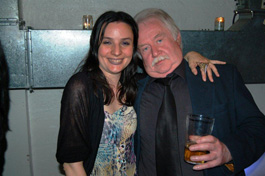
Apart from the excellent playlist of modern beat combo music, which soon had Professor Barry Forshaw strutting his stuff on the dance floor, the main talking point of the party was the splendid t-shirt worn by Serpent’s Tail boss Pete Ayrton:
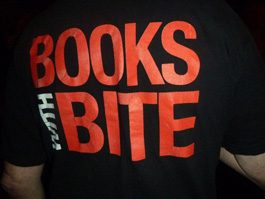
I have long since ceased to predict winners in the many crime writing awards currently available as my disastrous run of recommendations in the past few years has lost me many writer friends and often resulted in me crying into my barley wine and wailing in the wilderness at being so out-of-touch with the judging establishment.
I have, I admit, been tempted to throw my hat in the ring now that the nominations for the Barry Awards, run by American magazine Deadly Pleasures, have been announced. In the Best British Novel category (a shortlist which actually includes books by Irish and Swedish authors) I would heartily support Kate Atkinson’s Started Early, Took My Dog and Reginald Hill’s most excellent stand-alone thriller The Woodcutter, but out of respect for both these books and their authors, I shall refrain from comment.
I am fairly confident in making one prediction, however. I predict that one title not featured on next year’s shortlist for The Last Laugh Award made at Crimefest will be The Winter of the Lions, from Harvill Secker, by Jan Costin Wagner. Not only is the author German, but his crime novel is set in Finland and features – according to the cover blurb – melancholy Finnish detective Kimmo Joentaa. A melancholy Scandinavian detective? That’s a new one on me.
I am fairly safe in reporting news from the Awards Front where it concerns two of my favourite writers, Louise Penny and Brian Freeman, who are pictured here at a seminar in Cambridge a few years ago – although I do admit from the surroundings it does rather give the impression that both are being held in a cellar by terrorists.
American Brian Freeman’s The Burying Place has been short-listed as Best Novel of 2010 in the International Thriller Writers awards, and so it should have been, for Brian not only writes exceptionally good psychological suspense thrillers but he also does a very interesting line in promotional leisure ware. I am especially fond of my t-shirt bearing the title of one of his books: Immoral; though I often wonder why he thought that one would be appropriate for me.
Canadian author, renowned lumberjill and notorious distiller of 100-proof maple syrup, Louise Penny has already bagged an Agatha Award at the Malice Domestic convention recently for her novel Bury Your Dead. She is pictured here at Malice with my old Sisters-in-Crime partner Margaret Maron where both these award-winning authors expressed their total confidence in my powers of prediction.
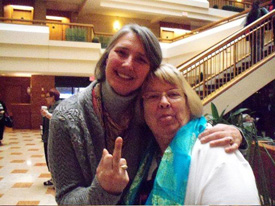
Bury Your Dead has also been shortlisted as Best Novel in the forthcoming Arthur Ellis Awards given by the Crime Writers of Canada. Now I have absolutely no sway over the decision-making process adopted by the Crime Writers of Canada (or anywhere else for that matter) but thanks to a curious loophole in their by-laws, I actually am a proud member of the International Thriller Writers organisation. However, I will resist putting in a good word for Brian Freeman as I will surely jinx his chances of winning and then where would I get my t-shirts?
I mentioned last month that I was looking forward to devouring Nick Stone’s latest thriller Voodoo Eyes (from Sphere) and I am delighted to reveal that something in this column was true and I really did enjoy it.
This is Stone on territory he knows well and the centrepiece of the book is a road trip through Cuba which his hero Max Mingus takes in the company of a too-smart-for-his-own-good transvestite called Benny, both of them on the run from various police forces, secret and otherwise, the fearsome Cuban mafia and Mingus’ personal nemesis, the self-appointed voodoo god, Solomon Boukman.
What prompts this bizarre, but totally fascinating journey, are the murders in Miami of two of Mingus’ former policemen colleagues and the web of intrigue surrounding their execution-style killings seems to involve the expulsion, years before, of black Americans branded criminals or terrorists who were given a safe haven by Fidel Castro.
From murderous Miami to a secret island sanctuary off the Cuban coast, via the bizarre entity that is Guantanamo, everything is corrupt or in a state of decay and the reader is left in no doubt that Nick Stone has been there, seen that and felt for it. The scenes in Cuba and especially those in the smaller towns outside Havana, are wonderfully written and both evocative and memorable.
I really must, however, raise two queries with Nick Stone the next time I run into him in one of London’s many watering holes. Firstly, it strikes me as slightly odd that his hero, Max Mingus, after 30(?) years as a cop, a convict and now a private eye in Miami, Florida, has not picked up a basic understanding of Spanish – which as it turns out would have been quite useful.
Secondly, although boxing is mentioned in the early, Miami, section of the book (indeed Mingus and one of the murder victims have personal links to a specific boxing gym), I was quite surprised it wasn’t in the Cuban sections, other than where Mingus has to display his skill at fisticuffs. I always thought that boxing was something akin to the national sport of Cuba and indeed Cuba has shown herself to be a boxing powerhouse at the Olympics in recent decades.
As I know Mr Stone to have some experience of, and considerable skill in, the noble art himself, I am surprised at the omission. On the other hand, because Mr Stone has considerable skill...etc... I probably won’t mention this to him and confine myself to praising his splendid new novel.
THE INCREDIBLE SHRINKING COMEDIANS
I have always prided myself on being ‘off topic’ (as the chattering classes would say) when it comes to two specific subjects: Scandinavian crime writing and the worrying tendency of publishers to shorten the names – in the cause of fashion? – of some of the United Kingdom’s finest writers of comedy fiction.
Despite threats from Headline’s fearsome in-house security service and the blatant offer of bribes, I have staunchly continued to refer to Colin Bateman, that impish Ulsterman, as Colin Bateman even though his publishers insist that he is now called simply Bateman.
Now, to my horror, I see that Christopher Brookmyre, that award-winning Scottish funster sometimes known as ‘the Frankie Boyle of crime-writing’, has been shaved – nay, chopped – by his unfeeling publisher Little Brown so that on his new novel Where The Bodies Are Buried, Christopher has now become merely ‘Chris’.

I take a dim view of all this for I well remember being reprimanded by that legendary Collins Crime Club editor Elizabeth Walter for once referring to Reginald Hill as ‘Reg’. Pinning me to the wall with an imperious eye, Elizabeth pronounced: “It is Reginald, not Reg. We don’t refer to Agatha Christie as Ag do we?” As a consequence of that telling-off, Bateman to me will always be Colin Bateman and Chris will always be Christopher, and whilst I realise I may be in the minority here, I have to ask where will this all end? Will Malcolm Pryce suddenly become Mal? Not to mention those other comic genii Jas Fforde, Doog Lindsay and, of course, Roo Dudley Edwards or perhaps even just Rude Edwards?
Steve Holland is something of a connoisseur of British pulp fiction and an acknowledged expert on its heyday, which was I suppose the 1940s and 1950s as proved by his study of paperback publishing, The Mushroom Jungle, and his excellent account of the career of that prolific pulpster Steve Frances in The Trials of Hank Janson. (The trial of Janson having far more of an impact on British life than “his” books ever did!) In his latest book, Mean Streetmaps (Bear Alley Books), Holland offers a collation of articles written mostly in the 1990s for the magazine Crime Time and a fairly eclectic mixture it is too.
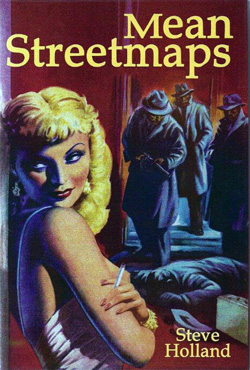
Given his personal sphere of interest, he is, as to be expected, always interesting and highly informative on the pulp underbrush of crime fiction as cultivated by such names as ‘Griff’, Ben Sarto and Dail Ambler – and if those names mean nothing to you, don’t worry about it; you are not alone. Expanding into more classical noir crime fiction, Holland also pens very decent essays on James M. Cain, Caroll John Daly and Black Mask magazine and first rate ones on W. R. Burnett and Mickey Spillane –of whom you certainly should have heard.
Holland is on less firm ground when he has a go at screenwriter Joe Eszterhas (pronouncing that “There can’t be many people who haven’t seen Basic Instinct” – to which I would say: Oh yes, there are; I suspect that more people have seen The Simpsons spoof than the actual film) and director David Fincher; and then there is a piece on Len Deighton which is peculiarly flat.
Still, we should be grateful for his fabulous article Let Me Die In Drag on that legendary Hollywood director Edward D. Wood (the auteur of such classics as Glen or Glenda and Plan 9 From Outer Space) who, as it is revealed, also wrote intriguingly sleazy crime fiction which even Steve Holland admits was “blatant crap”.
If one has to carp, then one could take umbrage at what seems to be Holland’s central premise that pre- and post- WW2 there were disreputable pulp paperbacks and there were ‘Golden Age country house murder stories’... and nothing else. He also takes Ronald Knox’s Detection Club Decalogue far too seriously, but then this is a collection of journalism written over ten years and not a cohesive history with a central thesis.
The book could have done with better proof-reading (“Bablliol College Oxford” is my favourite) and as among the novels referenced are those with the titles Trading With Bodies, Hold That Tiger, Hell-Bomb Floozies, Virgins Die Young and Back Alley Blonde, the book really does cry out for illustrations. As there are none, I provide two here:
Further details of Mean Streetmaps, and much more, can be found at
http://bearalleybooks.blogspot.com
|
When I saw a blurb on the back cover of a book which promised to introduce me to “the best detective in the world” my immediate reaction was: I’ll be the judge of that!
The new fictional detective in question is Californian private eye Claire DeWitt and the book, from those Fabulous Faber people, is City of the Dead by Sara Gran.
Whether Claire DeWitt is the best (fictional) detective in the world is open to debate, though probably not with Claire DeWitt, for whom detecting – as opposed to solving crimes or righting wrongs – is the very core of her existence. As a character she has been described as ‘a cool blend of Nancy Drew and Sid Vicious’ but that does not, in my not-so-humble opinion, do her justice.
For a start, I don’t think that particular ‘Sid and Nancy’ comparison is meaningful as no British reader would think someone named after a hamster was cool and ‘Nancy Drew’ never achieved the iconic status here that she did in America. (We had ‘The Famous Five’, girls called Titty who liked messing about in boats and gals from posh boarding schools who wore monocles.)
However, there is no doubt that Sara Gran has created a fascinating character in Claire DeWitt – a private eye dedicated to the art of detection, who carries around her own finger printing kit and I-Ching set in her never-ending search for clues, however ethereal, to the disappearance of a New Orleans District Attorney in the wake of Hurricane Katrina.
Sara Gran
City of the Dead may be a post-modern take on the private eye novel, or a surreal examination of a disordered imagination, either way it is strangely hypnotic and particularly good on its evocation of the devastated city of N’Orleans. And if Claire DeWitt is not actually the best detective in the world, she’s certainly one of the most unusual.
I am perfectly aware that there is such a thing as the Last Laugh Award for comic crime-writing. In fact I seem to remember winning two of them in the good old days when one could bribe or blackmail a judging panel rather than have to rely on the vagaries of democracy.
But until recently, I was unaware that there was a 1963 crime novel featuring American private eye Mike Power called The Last Laugh by Paul Denver.
And I also have to admit that I had never heard of hero ‘Mike Power’ nor even author Paul Denver. I believe ‘Paul Denver’ was a pen-name (as was ‘Dale Bogard’) of a prolific British writer called Douglas Enefer (born 1906), who apart from tough, American influenced hardboiled thrillers also wrote novelizations of the ‘Cannon’ television series starring William Conrad, and scripts for The Saint and Coronation Street.
However, I most certainly have heard of L.C. Tyler who has won the 2010 Last Laugh Award at the recent Crimefest in Bristol, for The Herring in the Library just as his new novel is about to hit the bookshops.
If I have a problem with the charming Len Tyler’s series of equally charming “Herring” novels, it is that he seems to be having far too much fun writing them. When will he learn that comic crime-writing is a soul-destroying activity which usually ends in tears, Chancery or an unhealthy affection for Buckfast Tonic Wine?
Len Tyler’s series hero, Ethelred Tressider, is a ‘serious’ crime novelist and has already discovered the trials and tribulations of that profession and is constantly reminded of them by his literary agent, the formidable Elsie Thirkettle. Indeed Elsie is present, and always willing to offer an unhelpful hand, in Ethelred’s new adventure Herring On The Nile, from publishers Macmillan.
The book is set on a paddle-steamer tourist cruise up the strangely crocodile-free Nile, the passenger list containing all the usual suspects: an impoverished aristocratic femme fatale, a seedy private eye, a dodgy Egyptologist and even dodgier Egyptian policemen. Needless to say there’s a murder and a missing pistol; then comes the explosion...
Told alternately by Ethelred and Elsie (in different typefaces which is slightly annoying until you get used to it), intelligent readers will notice many sly references to a certain book by Agatha Christie and only a buffoon would fail to be amused at the running gags about crime writing, including four cracking Dan Brown jokes. (Four! Count them!)
Most impressive of all, though, is Page 12, where Ethelred Tressider is asked to list the crime writers he most admires. Despite the inclusion of certain Scandinavians (surely a printing error in the Uncorrected Proof I was sent), Ethelred’s list is a commendable one and includes: Colin Dexter, Ian Rankin, P.D. James, Kate Atkinson, N.J. Cooper, Louise Penny and Mike Ripley. This must make it one of the best Page 12s I’ve read this year.
I am slightly confused, however, by the publisher’s “cover blurb” which quotes on the one hand the Literary Review describing the books as “sophisticated metafiction” and on the other, quoting a review from the Financial Times which praises the books which “sustain the game playing without burdening the story with metafictional cleverness”.
As I have absolutely no idea what “metafiction” is, I refuse to lose sleep over the matter.
FROM THE GROVES OF ACADEME
Speaking rather more seriously about Agatha Christie, the Great Dame will be the subject of a one-day conference at the Department of Film and Media, University of Derby in September.
The keynote speaker will be Professor Sarah Street, of Bristol University, and the conference is likely to include a session on television and film adaptations of her work. I do hope there will be some mention of my old friend and fellow boulevardier Charles Laughton who, in his youth, made a splendidly unctuous Hercule Poirot.
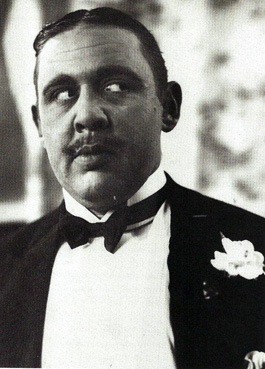
Before then, on 16th June to be precise, there will be a “Meet the Authors” seminar organised by the rather long-winded Culture, Writing and Performance Department within the Faculty of Arts and Human Science at London South Bank University, which if memory serves is on Borough Road not that far from the historic wine bar The Boot and Flogger...but I digress.
The “Meet the Authors” seminar is sub-titled Choosing the Best in Crime and Mystery Fiction and therefore who better to chair the top-of-the-bill interview with crime writer Frances Fyfield than Professor Barry Forshaw? Indeed Professor Forshaw has a punishing schedule these days, interviewing crime-writer after crime-writer in a seemingly endless stream and I am sure his professionalism will bring the best out of interviewee Frances Fyfield when she submits to the Forshaw grilling.
Oddly, though I have known Frances for twenty years and am a great admirer of her novels, I did not realise until I heard she was being interviewed by the Professor that she must be Scandinavian....
For legal reasons, I will not be attending, which is perhaps just as well as on every previous visit to The Borough area of London, I have never managed to get further south than the Clink Prison or The Boot and Flogger. Sometimes both in the same afternoon.
DISPATCHING THE BAD GUYS
Despite the vast number of feral children who range uncontrolled over Ripster Hall and its grounds, I am quite sensitive, even squeamish, when reading thrillers in which children are abused or put at risk. And I have to admit that whilst reading The Dispatcher by the winner of last year’s New Blood Award, Ryan David Jahn and published by Macmillan, the hairs of the back of my neck sprang to attention many times.
The plot revolves around a young girl (not the first) abducted seven years before in a small Texas town to complete the dysfunctional, childless family of a couple of, for want of a better word, red-neck, cracker-barrel nutters. That a young girl could be imprisoned and successfully hidden from sight in a small community for so long would seem a quite fantastical plot line were it not for the fact that we know such horrible things can and do happen.
The tormented, plucky girl escapes her crazy captors long enough to call the police and who should be the “dispatcher” answering 911 calls but the girl’s real father. From then on a violent chase across the south-western states of the US ensues with a bloody shoot-out climax in a modern ghost town which, for me, had faint echoes of Sam Peckinpah’s famous Western Ride the High Country.
This is a thriller with an uncomfortable plot premise, some appallingly unsavoury characters, bloody violence and a very nasty torture scene (the hero doing the torturing), so all-in-all not exactly an easy read. But, my goodness, it is gripping; a real white-knuckle ride.
I am already salivating at the prospect of, in March 2012, the UK publication (finally) of Ben Pastor’s second Martin Bora novel, Liar Moon and publishers Bitter Lemon are to be commended for ‘discovering’ the first, Lumen, which came out earlier this year.
For anyone not paying attention to this column, Martin Bora is one of the most interesting fictional detectives around - an aristocratic German serving in Wehrmacht Field Intelligence in the early days of World War II – and author Ben Pastor is one of the most interesting crime writers around. Apart from being a distinguished archaeologist (so I am, possibly, biased) it has taken more than ten years for her to become an ‘overnight sensation’ in this country. She also writes wonderfully detailed historical mysteries set in early 4th century Romewhich surely cry out for a British publisher.
I am even more excited (a considerable achievement at my advanced age) at the news that there is a third Martin Bora thriller on the stocks – at least in Italian.
Set in Leipzig in 1939, Il signore delle cento ossa has just been published in Italy (Verbena ‘Ben’ Pastor was born in Italy, although has taught and lived in the US for many years) and the promotional video for it is on something called YouTube at
http://www.youtube.com/watch?v=pb6ePq6uQxc.
Fluency in Italian is not essential to get a flavour of the book but I shall henceforth live in hope and expectation that a UKedition of The Master of One Hundred Bones will appear eventually – preferably in my lifetime.
For medical reasons (certainly not legal ones), I was unable to attend the launch party thrown by publishers Macmillan and that most fashionable night spot Goldsboro Books in London, for the Brian McGilloway’s new novel Little Girl Lost.
|
Although born in Derry, this is, I believe, the first thriller Brian has actually set in Northern Ireland and I was particularly anxious to discuss the “extraordinary advance praise” the book has received ‘via Amazon Vine’.
Now the normal way of things is that intelligent and respected professional crime fiction reviewers receive proof copies of new novels with an exhortation (a legal mechanism slightly less effective than a Super Injunction) from the publishers not to publish a review before the official publication date. Recently, however, the mysterious Mr Amazon Vine seems determined to put legitimate reviewers out of business by flooding the jolly old interweb with dozens of reviews (40 in the case of Brian McGilloway’s new book) well before publication date, thus taking the wind out of the sails of professional reviewers and possibly the food from the mouths of their many children.
For those not familiar with Mr Vine’s activities – which have been growing of late – I can reveal that he hides his identity behind an insidious computer virus, but I have managed to acquire a picture of the rogue himself.
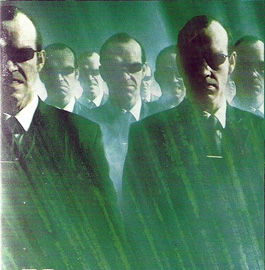
Just in case you were dying to know what this summer’s “most gripping, revelatory thriller since The Da Vinci Code” was going to be, I am assured by publishers Sphere that it will be The Dead Sea Deception by ‘Adam Blake’.
The plot involves a band of sinister assassins who believe themselves descended from the renegade apostle Judas Iscariot who presumably, as the book’s blurb implies, knew that “everything about the death of Christ is a lie”. Or at least he did in that excellent thriller The Judas Gospel (aka Judas!) written by the sadly-overlooked crime writer Peter Van Greenaway.
Not only was Van Greenaway’s excellent thriller (containing homicidal Vatican priest assassins) published in 1972, over thirty years before Dan Brown’s blockbuster, but – as far as I can ascertain – before the actual ‘Gospel of Judas’ was available in translation, having thought to have been discovered as part of a Coptic papyrus manuscript in Egypt which was named the Codex Tchacos (after the family name of antiquities dealer Frieda Nussberger-Tchacos as I am sure most of my readers knew.)
The story of that Codex has enough incident for several plots above and beyond the subject matter itself. No one seems quite sure who found it, or where, or how it found its way on to the antiquities ‘grey market’, first in the 1980s and then again about ten years ago. And is it true that almost 20 pages of the original text have gone missing since it first came to light?
I think we should be told, but for the moment the big mystery is which “internationally bestselling novelist based in London” hides behind the pseudonym ‘Adam Blake’, the author of The Dead Sea Deception. Before the Super Injunction descends and the Twitter storm begins, I will say only this: Could Adam Blake possibly be Liverpudlian Mike Carey, the author of numerous fantasy and graphic novels? I only suggest this because my proof copy of the novel says (c) Mike Carey 2011 which I take to be true, unless of course everything I know about publishers’ copyright accreditations is a lie and this is another mysterious conspiracy....
The continuing stream of books thudding through the letter-box here at Ripster Hall is rather depressing; depressing because a remarkable number of them are so infuriatingly good, I simply have to make time to read them. When will publishers realise that summer afternoons are purely designed for boosting the sales of Pimms and rosé wines as the scent of newly mown grass mingles with burning barbeque meats, and not gripping reading?
I fear I will not be able to resist the chance to discover a new (at least to me) Italian detective, Inspector Bordelli. This is partly due to withdrawal symptoms following the inexplicable cancellation of the TV series Zen and partly because the character of Bordelli comes highly recommended by none other than Andrea Camilleri, who knows a thing or two about Italian crime fiction.
Death in August by Marcho Vichi, published here this month by Hodder is the first of the Bordelli mysteries to appear in English. Author Marco Vichi is a well-known, award-winning writer in his native Florence, where Death in August is set, in the year 1963.
And I have already succumbed to temptation and started reading The Cut by George Pelecanos, coming from Orion in August.
I’m hooked already and predict great success for George’s new fictional hero Spero Lucas. Just remember, you heard that here first....
In July I hope to find time to raise a glass with that elegant prose stylist (and dashingly handsome) Mark Mills to celebrate his latest novel from HarperCollins.
I thought Mark’s last novel, The Information Officer, was quite superb and yet it seems less well-known that his earlier The Savage Garden. Be that as it may, his new one, House of the Hanged, looks a corker, starting with the flight from Russia during the revolution of a very young British intelligence officer and moving into the 1930s, where the older and definitely wiser hero is living a quiet life at the poor-man’s end of the French Riviera. Or trying to live a quiet life.....
But before I settle down to my summer reading, I will struggle up to London (despite the stagnant river and plague of mosquitoes) to attend the launch of Eoin Colfer’s first crime novel Plugged.
With a cavalier disregard for the physical dangers of negotiating the backstreets of a tourist-infested London, I am determined to attend if only to tell the charming Mr Colfer (the author of the hugely enjoyable Artemis Fowl books) that we lower-, or at best mid-, list crime writers really do not need the competition.
For those more technologically advanced than myself (by which I include most of the livestock, wild and domesticated, which roam the grounds of Ripster Hall), books are apparently now available in something called electronic formats.
Whatever that actually means, I am delighted to see that the high-tech generation has not forgotten (although a recent crime fiction “encyclopedia” did!) that fine British writer Desmond Cory, whose best-known creation was British spy Johnny Fedora, a James Bond like character whose fictional debut actually preceded that of James Bond by two years, in 1951.
 Which makes this the 60 th anniversary of Fedora and to mark the event, his first adventure, Secret Ministry, is now available as a Kindle e-book and available from wherever e-books are...er...available.
And to mention just another kindle now available.....

Photographic evidence of Angel books in exotic places continue to flood in, none more dramatic that this one from the tornado-ravaged state of North Carolina in America where, on closer examination, an ancient copy of Angels in Arms seems to have been found within the trunk of a mighty, fallen oak.

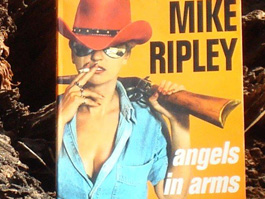
Far more soothing in context was the new Telos edition of Angel Confidential found in a gondola on the Grand Canal in Venice.

And from the soothing to the positively relaxing as two fine covers are discovered in a cane field in Mexico.
As my books seem to be having such fun out there in the wide world I am almost tempted to reactivate one of my many passports and go travelling.
Toodles!
The Ripster
|